Workplace policies can provide your business with the safety and structure you’ve been looking for.
This post has been updated in Nov 2021 for comprehensiveness.
Keeping your business protected and creating a safe work environment is imperative to its success.
After all, no one wants to work for an employer if their work environment feels unsupportive or unsafe.
So how do you achieve this? Well, it all starts with your businesses workplace policies.
Workplace policies are much more than just sets of rules. In fact, your workplace policies should be the backbone of your businesses structure and culture.
In this legal guide, we outline what workplace policies are, highlight their importance and dive into some of the most important policies your small business may need.
Read on for more.
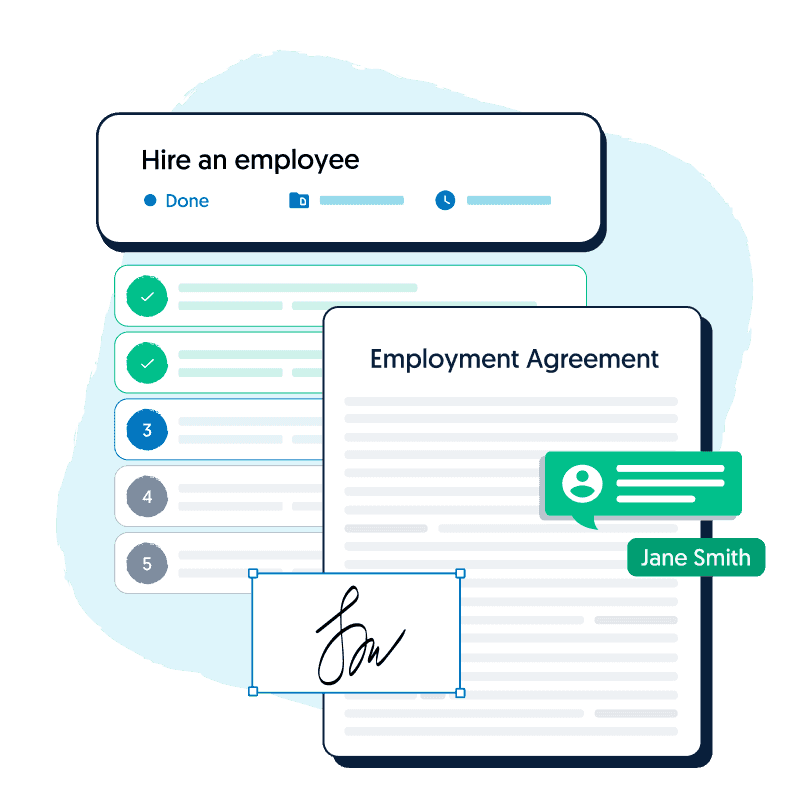
Are you looking to hire an employee?
Use our "Hire an employee" workflow to complete and check off all your legal requirements
What are workplace policies?
A workplace policy is a document of rules or guidelines that communicates your businesses standards and expectations regarding how your employees should behave and conduct themselves.
Your workplace policies can also set out how your business will respond or deal will employees who fail to abide by the rules set by your policies.
All in all, workplace policies for small businesses are there to help create a more structured working environment. They basically state what an employee can and cannot do in your workplace, as well as outline the consequences for non-compliance.
So, they work to inform your employees of their responsibilities and duties to your business and one another.
A great example of a workplace policy is a Harassment and Bullying Policy. Generally speaking, if you see harassment and bullying as a major no-no and want to set clear rules on what constitutes bullying behaviour and what actions your business could take, then this policy is a must-have.
The great news is there’s a range of important workplace policies your small business could implement.
Don’t worry, we go through each in detail in the paragraphs below.
But first, how exactly do these workplace policies benefit your small business?
Find out the answer below.
The benefits of workplace policies for small businesses
Implementing the right workplace policies for your small business can have an endless amount of benefits.
Do you want protection? A safe work environment? Informed employees? Well, your workplace policies can definitely help you achieve these things.
Below, we go through the top 2 benefits of having the right workplace policies in place.
Let’s jump into it.

1. A safe workplace environment
Of course, this is one of the top benefits of having great workplace policies in place for your small business.
It’s important that your employees feel safe, comfortable and supported — that’s exactly what your business policies will do.
How? Firstly, if your employees can see your business has strong policies in place regarding well-being and safety, then they’re more likely to feel safe and supported throughout their employment with you.
Secondly, as your policies should always be informative in detailing what is acceptable and non-acceptable behaviour, your employees will clearly understand what is expected of them and what rules they should follow.
When everyone is on the same page, compliance is sure to increase. After all, when employees understand your businesses rules, they’re simply more likely to follow them. As a result, these policies can nurture a safe and supportive working environment.
2. Clear action plans for your business
As a business owner, you can’t be everywhere at once. This is where your policies can play an integral role.
Your workplace policies can set clear action plans regarding how employees should report policy breaches, as well as steps outlining how your business will deal with an individual who is in breach of a policy.
So, it’s almost like a two-fold action plan. First, it’ll inform your employees of their responsibility to report any accident or non-compliance. Second, it’ll inform everyone of the consequences that may follow.
Importantly, your workplace policies will take the guesswork out of figuring out what to do if an employee is acting inappropriately. Therefore, they’ll help you manage any sort of crisis or non-acceptable behaviour more efficiently.
But, which workplace policies should a small business be implementing?
Find out the answer below.
The must-have workplace policies for your small business
Workplace policies are so much more than just documents of rules.
They work to keep your business protected by keeping your employees informed about your business behaviour standards and expectations. Because of this, policies are imperative to the success of any small or medium-sized business.
As a business owner, life can get extremely busy and it can be difficult to find the time to write up policies from scratch. Don’t worry, we’re here to help.
Below, we go through the 5 most important workplace policies, as well as provide you with a template for each to help you hit the ground running.
Discrimination Policy
As an employer, you must ensure that your workplace is safe and free of all kinds of discrimination such as race, sex, sexuality, disability, age, illness, parental status, political or religious beliefs and much more.
After all, discrimination is unlawful under the Discrimination Act, so having a Discrimination Policy in place ensures your workplace is meeting its legal obligations as a non-discriminatory place of employment. Therefore, this policy is a must-have.
Your Discrimination Policy should outline:
- Your businesses commitment to providing a safe and discrimination free workplace
- What type of behaviour constitues discriminatory or other unlawful behaviour
- The consequences for engage in discriminatory or other unlawful behaviour
- A clear grievance procedures for employees
Get started on your customisable Discrimination Policy template now.
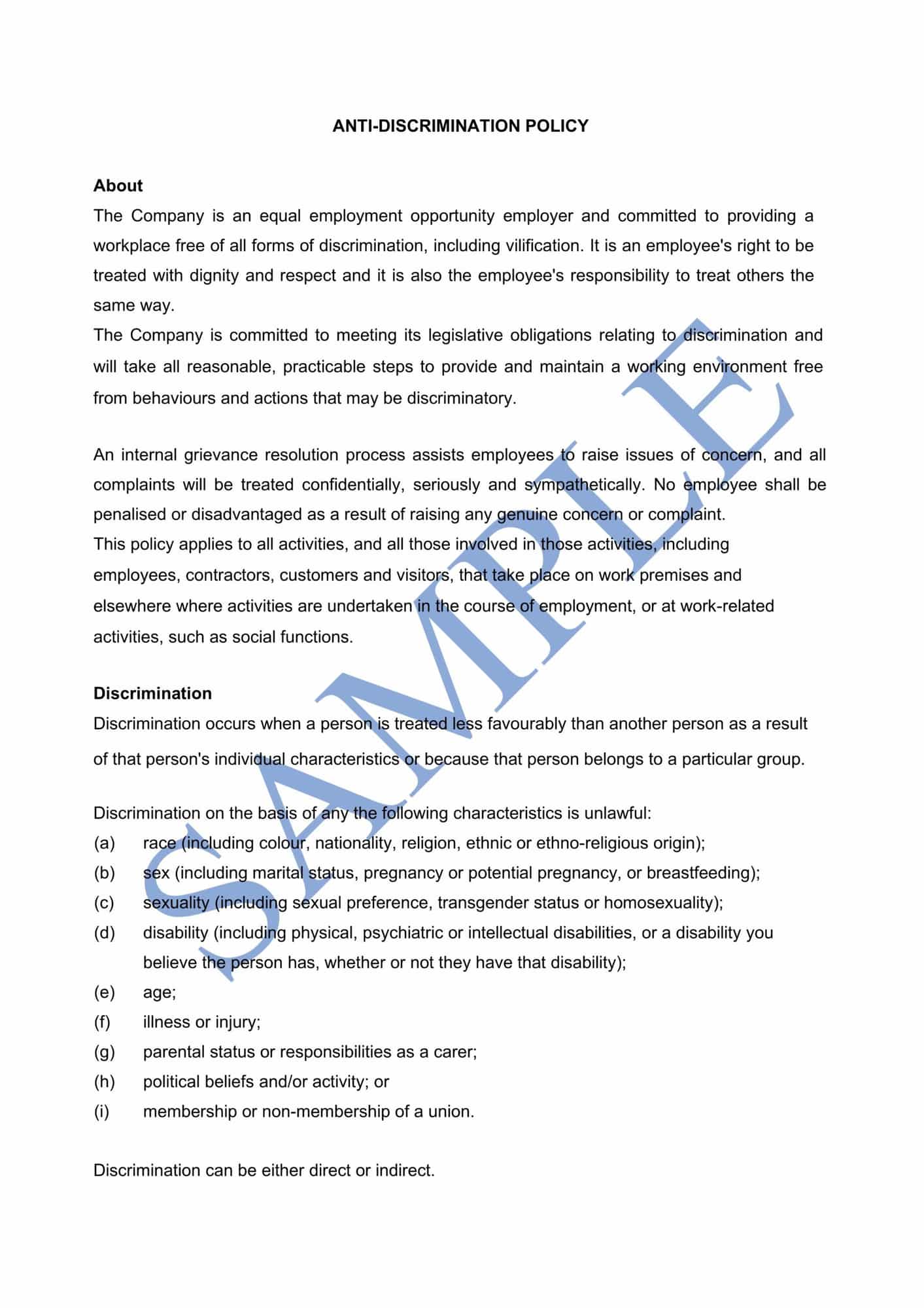

Harassment and Bullying Policy
This type of policy is used to promote a safe and respectful environment, much like a Discrimination Policy, however, it is much broader.
A Harassment and Bullying Policy is the perfect way to inform your employees about what type of behaviour will not be tolerated in your business. It’s also the most effective method of communicating how complaints and reports should be made, as well as the consequences that may follow.
In general, your Harassment and Bullying Policy should cover:
- Your business objectives and commitment to providing a safe space
- What behaviour will be deemed as harassment or bullying, such as inappropraite touching
- Clear processes for how employees should flag and report any instances of harassment and bullying
- The conseqeunces that may be taken against an employee found to be engaging in inappropriate behaviour
Check out our Harassment and Bullying Policy template.
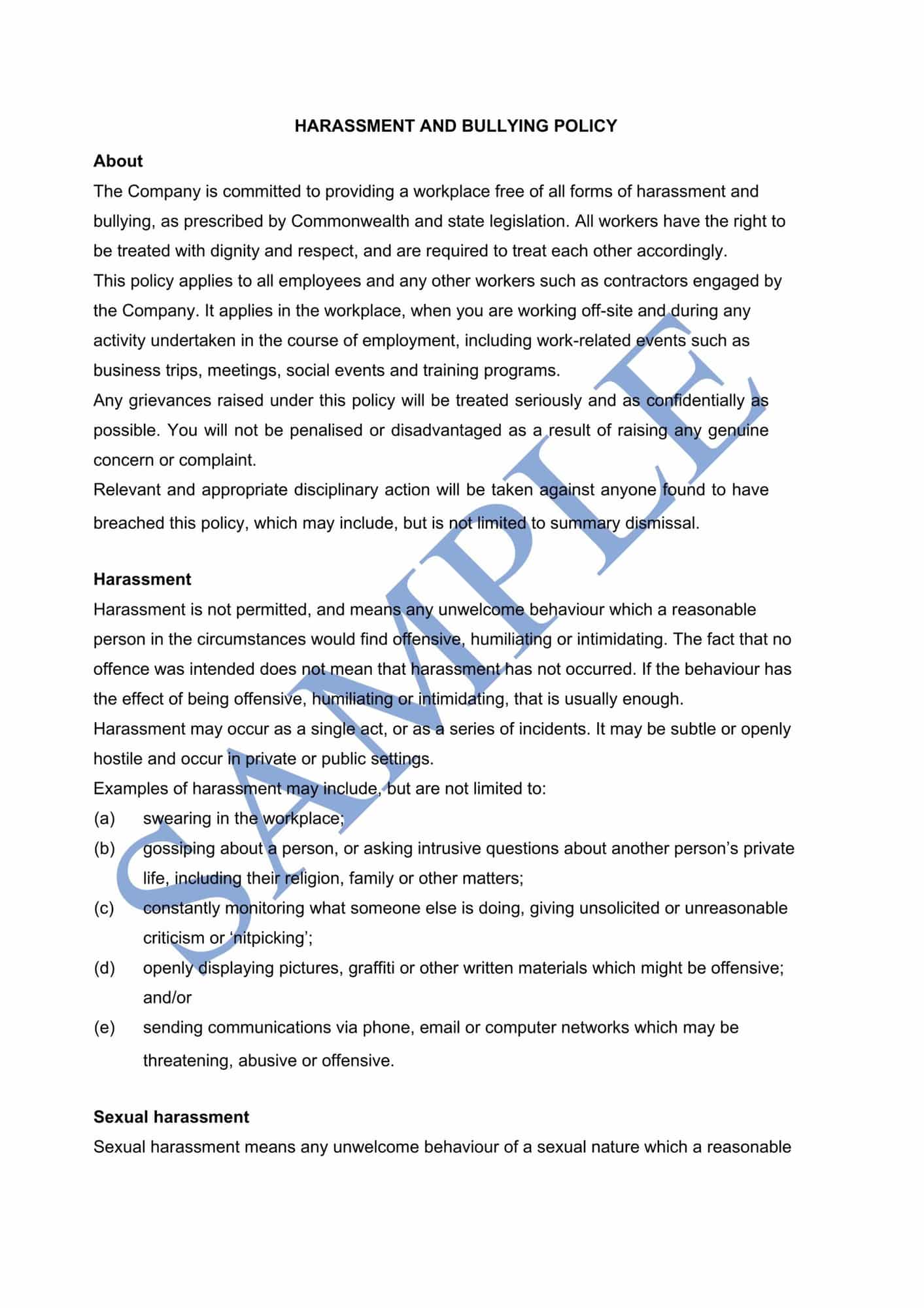

Drug and Alcohol Policy
If you’d like to make it clear to your employees that drugs, alcohol or other prohibited substances have no place in your business, then implementing a Drug and Alcohol Policy is the way to go.
With this policy, you can clearly outline what substances will not be tolerated or when they may be tolerated. For instance, alcohol may be acceptable during social events.
You can also outline your business expectations when it comes to smoking and prescription medications that affect ones ability to perform their job safely.
Your Drug and Alcohol Policy should have provisions surrounding:
- What substances are prohibited in the workplace
- Clear guidelines on alcohol consumption during business social events
- Guidelines on any alcohol or drug testing (if applicable to your workplace)
- Provisions regarding help and assistance offered by your business to employees with substance abuse issues
Our customisable Drug and Alcohol Policy can help you get started.
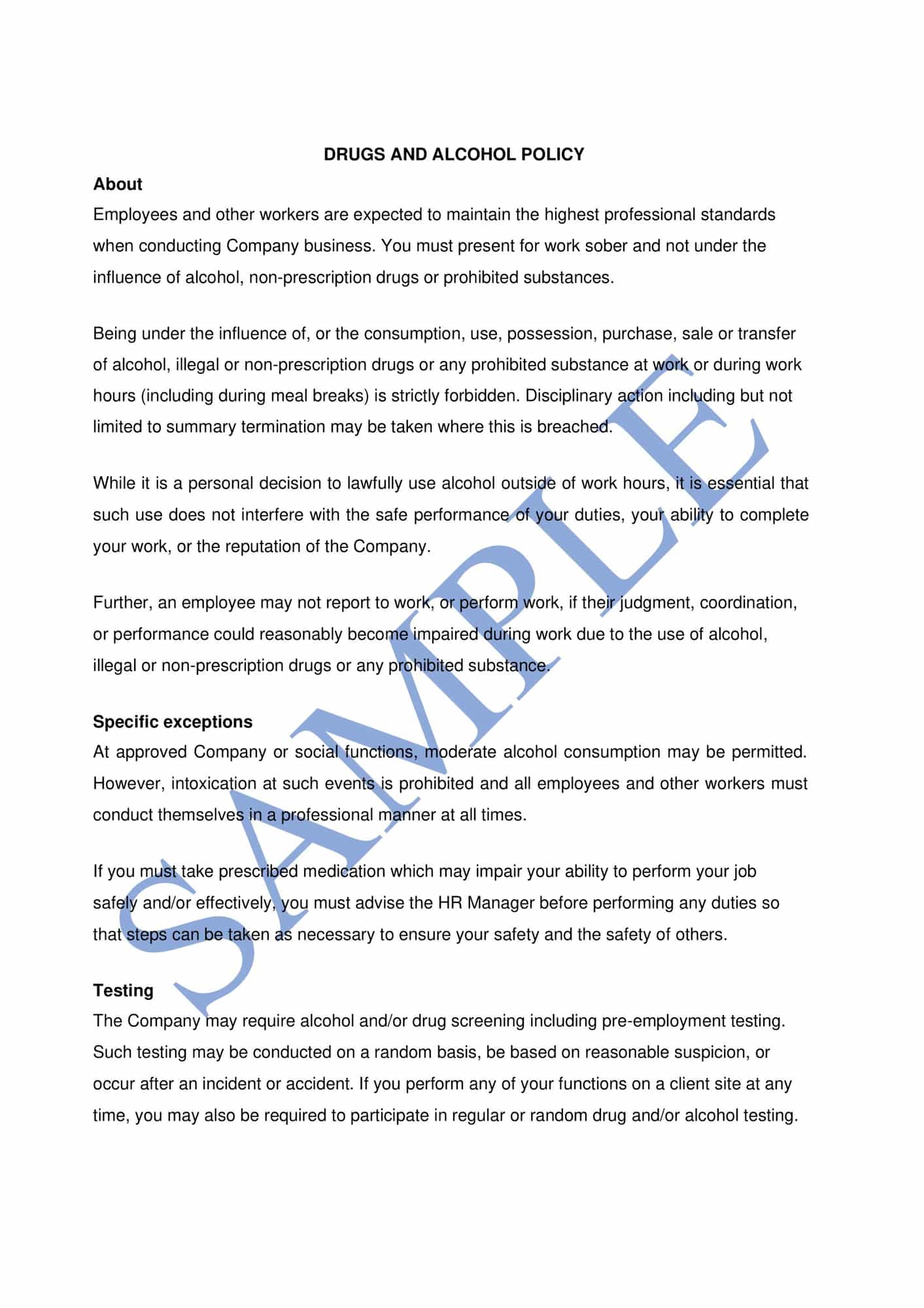

Social Media Policy
Around 90% of small-to-medium-sized businesses have a public Facebook page and around 57.6% of the world’s population uses some form of social media, having a Social Media Policy has almost become a necessity.
Want to protect your business image and inform your employees on how to be ‘business friendly’ on social media? Well, a Social Media Policy will do just that.
An effective social media policy will cover appropriate use of all social networks and touch on cyberbullying, while also confirming your stance on confidentiality, conflicts of interest and use of company property (including email address and logo).
Your Social Media Policy can cover:
- What will be deeemd as appropriate and inappropraite uses of social media
- How employees should identify themselves in connection to your business
- Rules on social media usage during working hours
- Any monitoring guidelines for your business social media pages
- Conseqeunces for the employee who breaches the policy
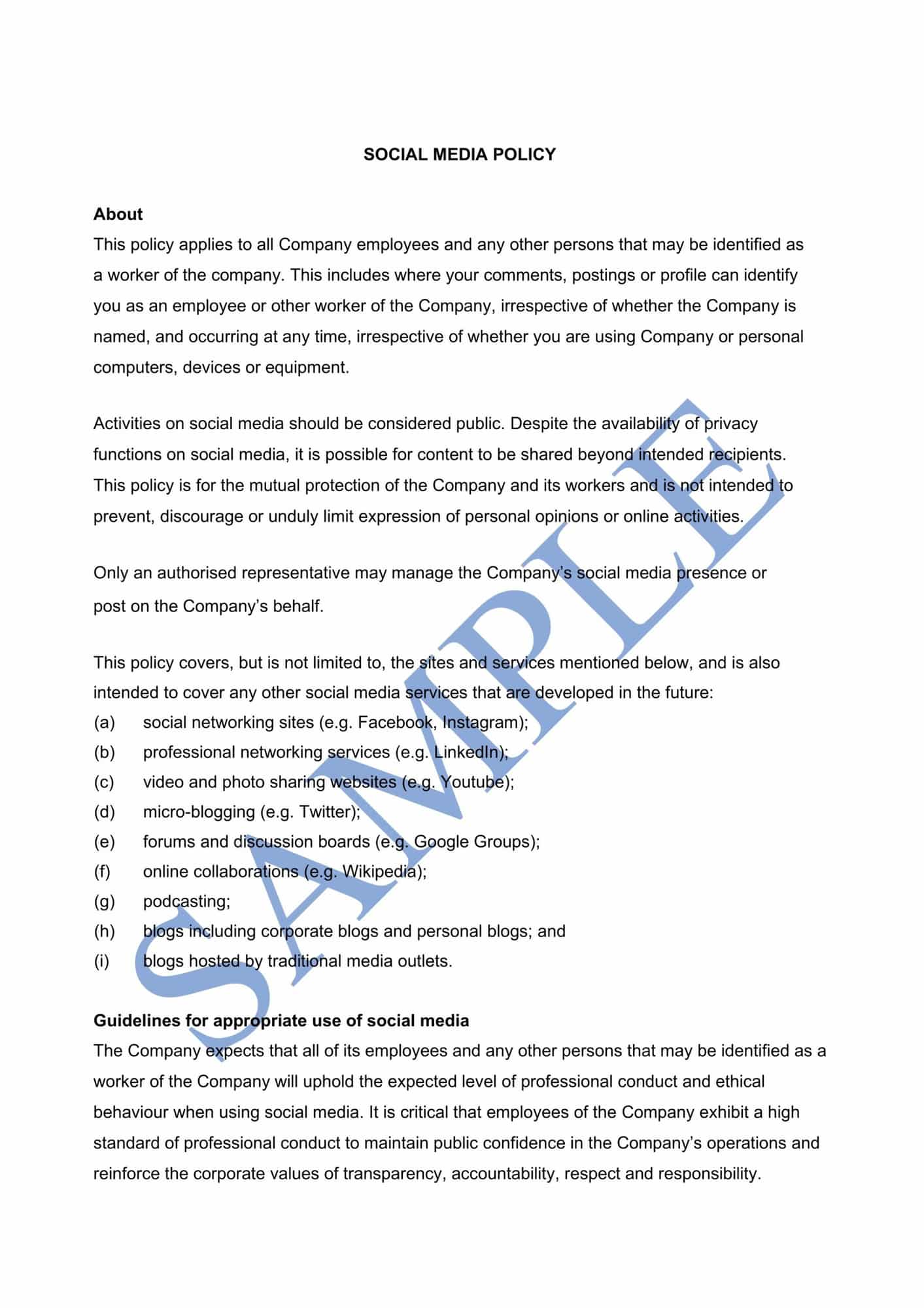

Acceptable IT Use Policy
As its name suggests, this type of policy explains what types of conduct is acceptable regarding an employees use of business information technology resources.
Your Acceptable IT Use Policy may relate to your employees’ behaviours regarding computers, headsets, work emails, work phones, internet usage and much more.
Basically, this policy will outline what your employees can and cannot do regarding your businesses IT resources.
Commonly, an Acceptable Use Policy will outline:
- What electronic communications and resources can and cannot be used in the workplace
- How IT communications will be monitored
- What IT systems or data is confidential
- Consequences for failing to abide by this policy.
You can get started on creating your own Acceptable IT Use Policy by using our template.
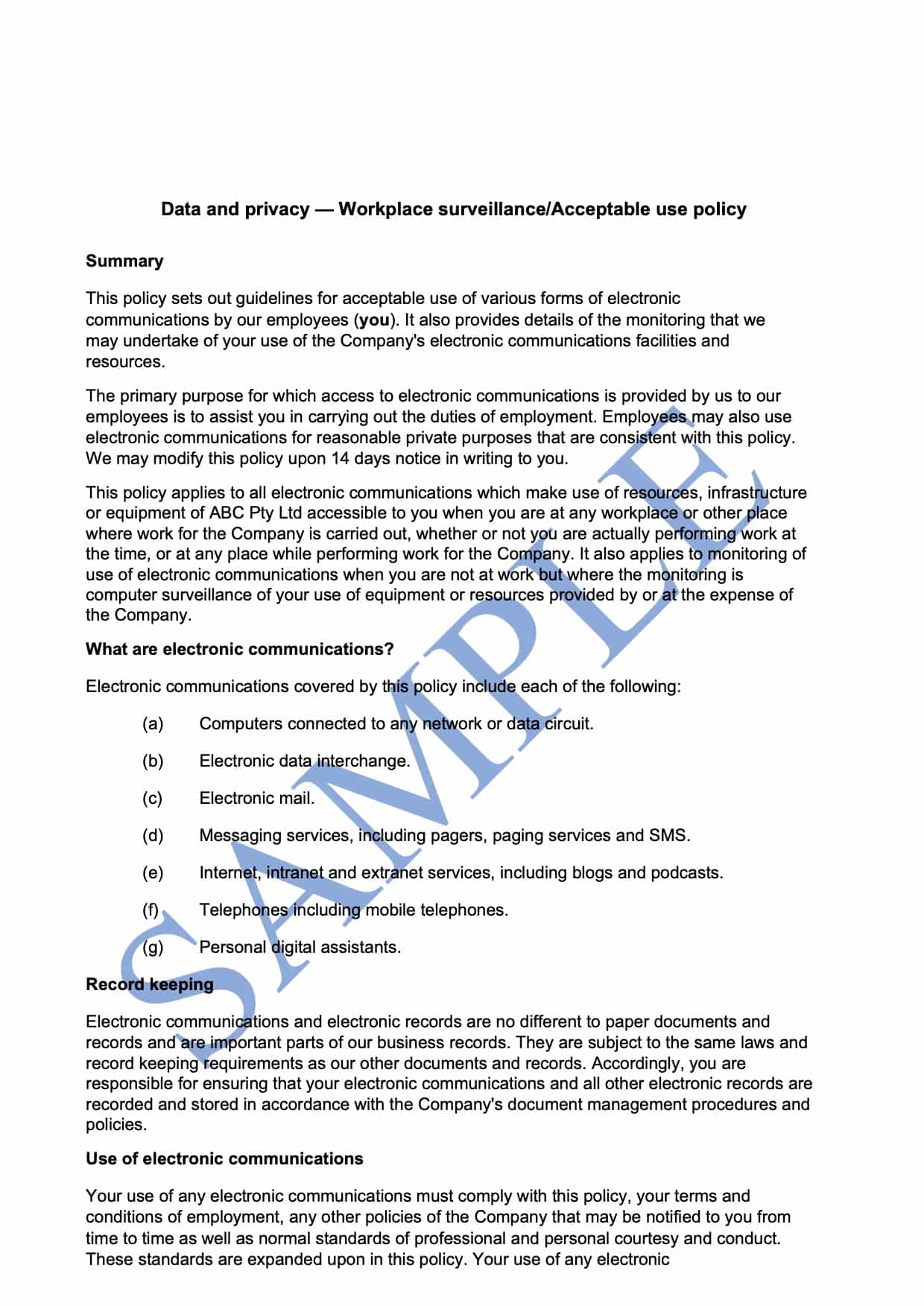

Burning questions surrounding workplace policies

How do I implement my workplace policies?
Workplace policies are a great way to show your employees that your business is dedicated to creating a safe, free and supportive environment. However, there is no point in having all these policies in place if haven’t implemented them or don’t know how to.
To properly implement workplace policies, you must make your employees are aware of them.
In actual fact, implementation is pretty simple.
For instance, you could send out an email about the policies your business has, or the new policies your business has just created. You could even get your employees to sign off as having read and understood the policies. Many businesses even have training days about their workplace policies to ensure everyone is up to speed.
All in all, as long as you notify your employees of your businesses policies, they understand them and they’re easily accessible, then it’s likely you’ve successfully implemented your policies.
What do I do if an employee breaches a workplace policy?
As a business owner, there are several steps you could take to deal with an employee who breaches one of your workplace policies.
Of course, if the breach is extremely serious it may be grounds for the termination of that employee.
At other times, when the breach is more minor, it’s best to provide that employee with a written warning and educate that employee on your business safe practices.
Remember, just because an employee breaches a policy, does not automatically mean that you are entitled to let them go. In fact, doing so in circumstances where the termination was unfair, unjust or unreasonable could land you and your business in hot water.
So, if an employee has breached your workplace policies, it’s best to speak with an Employment Lawyer to seek tailored legal advice.
How we can help
Operating a business is hard work and we know that sometimes, you’re tight on time. That’s why we are here to give you that legal helping hand.
Whether you need new workplace policies and just want to update your old ones, we’ve got the template for your small business.
Our templates are fully customisable to suit your business to a tea. Plus, our lawyers are always happy to help you write your provisions, give you the guidance you need or review your policies.




